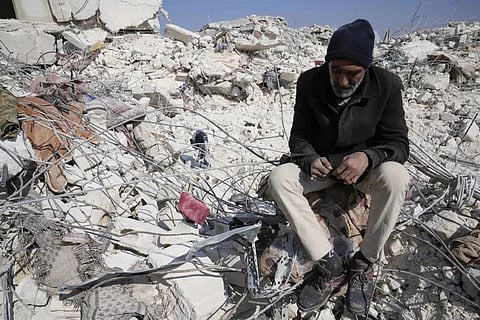

The UN waited as the people died. This is the message trickling out of northwest Syria after last week's earthquake.
For five days, people hit by the quake have been waiting for help. None came, National Public Radio (NPR) reports.
Rebecca Barber, a Research Fellow with the Asia Pacific Centre for the Responsibility to Protect, writing for EJIL: Talk! --Blog of the European Journal of International Law, says the road through Türkiye to the border crossing between southern Türkiye and northwest Syria, Bab al-Hawa, was damaged. Although, to quote the International Crisis Group’s Syria Analyst Dareen Khalifa, ‘there are a million routes to Syria’, Bab al-Hawa was the only crossing that – in January – the Security Council had authorised the UN to use. The Assad regime meanwhile was not allowing sufficient aid deliveries into opposition-held northwest Syria from Damascus. So the UN waited, as people died.
In shattered cities in northwest Syria, amongst the rubble, survivors flew UN flags upside down in disgust. One image shows the words ‘we are dead, thank you for letting us down’ scrawled across a collapsed slab in a sea of broken concrete, Rebecca Barber said.
According to NPR, residents of the town of Jinderis in northwest Syria heard the screams of those trapped under the rubble but, without the right machinery and equipment, were powerless to save them.
Now, the voices have fallen silent.
"We don't understand. Why are we alone?" asked Mahmoud Hafar, the mayor of Jinderis, the NPR quoted him as saying.
The report added: Now the Syrian civil defense teams are using the few excavators they do have to recover the dead. On Friday morning in Jinderis, at least 850 bodies had been pulled from the rubble. Zakaria Tabakh, 26, remembers cuddling his son, 2-year-old Abdulhadi, to sleep and laying him in his bed, where he was killed by the falling debris. Tabakh's wife died in the bed beside him. He said that few friends were able to come to the burial because they were too busy burying their own loved ones.
The earthquake is only the latest cruelty to befall the people of this region.
Many of the 4.6 million residents had fled here from other parts of the country, searching for safety from the barrel bombs and airstrikes of the Syrian regime and its ally, Russia.
After years of war, they've been left with nothing. Tens of thousands now live with almost no access to basic services in makeshift tents set up in the olive groves where the mud clogs and weighs down the legs of children playing outside, NPR added.
Even before this earthquake, according to the report, the United Nations said 4.1 million people were in need of humanitarian aid. The Syrian regime considers bringing aid to these opposition-held areas across the border from Turkey a violation of its sovereignty. The government, along with its allies Russia and China, have repeatedly vetoed votes at the U.N. Security Council to maintain more aid routes into Syria from Turkey.